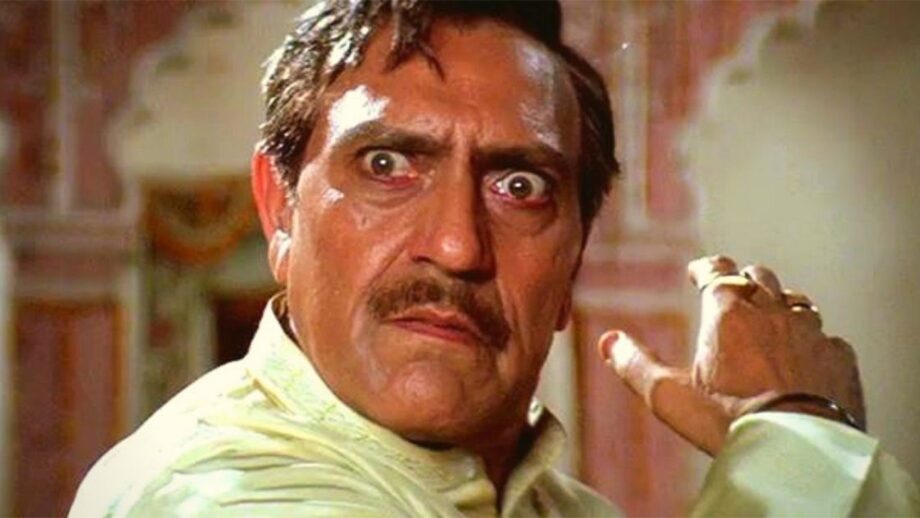“What a gentleman…and such a nice man to know,” writer-lyricist Javed Akhtar summed up the general dismay in the film industry over the sudden passing away of one of Bollywood’s most revered and in-demand character actors. He was not just a brilliant actor, but also a wonderful person.”
Kamal Haasan had this to say when Amrish Puri died on January 12. 2005 “Puri Saab was my leading man in Chachi 420. I masqueraded as a woman and he was the man who had the hots for me. Puri Saab was as usual, flawless. Since `Chachi` we kept in touch constantly. A true gentleman-actor.”
One of three brothers, Amrish’s elder brothers Chaman and Madan Puri were actors long before Amrish. At age 40 a career as an actor came belatedly to Amrish. His first screen appearance was in Sunil Dutt’s Reshma Aur Shera in 1971 where he made his debut alongside Amitabh Bachchan. Coincidentally they are regarded as two of the best voices ever heard in Hindi cinema. And it couldn’t be mere chance that a fortnight before his death Puri’s baritone provided the voiceover in Ab Tumhare Hawale Watan Saathiyon which starred Amitabh Bachchan.
Puri first made audiences and critics sit up and take notice in Shayam Benegal’s Nishant in 1975 where he played an immoral zamindar. Success in avant-garde cinema was instant, though the same cannot be said about mainstream cinema.
“Those weren’t easy years for me,” the actor with the booming baritone said to me once. “Recognition was hard to come by, and I had a family to support. I took on any and every villain’s role that came my way.” After struggling through years of small and not-so-small diabolic roles the actor became a household name with Mr India where he played the infamous cartoon-like villain `Mogambo` in 1987. Not since `Gabbar Singh` in Sholay had villainy in Hindi screen acquired such a swanky swaggering contemporary and quirky aura.
After playing the villain in innumerable films Puri’s career was injected with new life when he did Kuku Kohli’s Phool Aur Kaante and Priyadarshan’s Muskurahat in 1992. The two films cast Puri in non-villainous pivotal roles that gravitated him to the top as Bollywood’s most in-demand character-actor. Seldom, if ever did an actor other than the leading man acquire the respect and command the fee of Amrish Puri. Right till the very end when last year he played Priyanka Chopra’s suspicious and fastidious father in David Dhawan’s Mujhse Shaadi Karogi and Akshaye Khanna’s fretting and fumming father in Priyadarshan’s Hulchul (both hits!) Puri was perpetually cast in author-backed roles that demanded great power and strength and an indomitable screen presence.
As the homesick NRI in Aditya Chopra’s Dilwale Dulhaniya Le Jayenge, the benevolent feudal landlord in Priyadarshan’s Viraasat, Sunny Deol’ terminally ill vocally idealistic father in Raj Kumar Santoshi’s Ghaatak or Amisha Patel’s anti-India father in Anil Sharma’s Gadar: Ek Prem Katha Puri created a gallery of characters that count among the highest points in the history of mainstream Hindi cinema. He was rightly very proud and possessive of his celebrated voice. I remember after an interview he requested me to erase his voice from the tape. “I don’t want people to get their hands on my voice. Who knows how it may be used?” he had wondered. The voice is gone. And so is the man who made three words emblematic of evil joy. `Mogambo khush hua`. An era in character-acting has ended with Amrish Puri.
Vardhaan Puri has the mighty Amrish Puri as his grandfather, and that’s one helluva a responsibility to carry with you.Luckily Vardhan takes the responsibility in the right spirit.
Speaking about his illustrious grandfather Vardhan says, “I was lucky to have Daadu with me for 15 years of my life. we used to stay together and I was in the room next to his. Not a night passed when I didn’t up to sleep between my Dadu and Dadi.”
Curiously Vardhan’s father never showed any interest in acting. Says Vardhan, “My dad wanted to travel all the over the world. That was his ambition. So he joined the navy. I was an actor from my childhood.”
Since his Daadu played the arch-villain, Vardhan grew up cheering the bad guy. “I’d watch Daadu being mean and I’d feel happy. When he got killed in the films I’d get very angry.In London I kept asking my teachers how to deepen my voice. Perhaps it was the fact that my grandfather was reputed to have the deepest baritone possible . But I was told to work on the traits that I have,to sharpen the skills that I was born with and not to crave for what I don’t have. My Daadu was truly one of his kind,” recalls Vardhaan.


